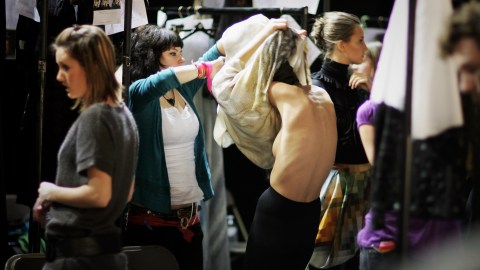Images of Unrealistic Beauty Don’t Harm Us Until We Let Them

An image cannot hurt you if you don’t pay it any mind. This is what researchers from Ryerson University, Canadafound when they conducted a study, examining how we process images of ultra-thin models and their effects on us.
The researchers conducted two experiments to see if imagery of seeing ultra-thin models was processed automatically or required a person’s full attention in order to feel its effects.
They found participants don’t compare themselves to the models when they’re preoccupied, nor did it cause their moods change in a detrimental way. However, another group of participants whose minds were unburdened and were able to give their full attention to the images felt worse at the end of the study.
Tom Stafford wrote about the report in BPS, adding:
“Thin-ideal images are so prevalent in our society that even a temporary effect could produce a consistent load of misery for individuals who attend to them. So the deeper question is how society would need to change so that such images are less prevalent, or so that paying attention to them is no longer celebrated as a priority.”
It’s good to know that a shift in thinking can help us to combat the effects these images hold over us, but it’s difficult to maintain this forever. The underweight, airbrushed models can be seen on billboards, online ads, and while scrolling through an internet store. It’s only a matter of time before we’re caught off guard and for a moment see our natural curves as unsightly fat. Over time, it gets to some people — young people, especially — more than others and they begin searching for some #thinspiration.
Motivation to start my day #thinspo#thinspirationpic.twitter.com/b8BWPqkCbO
— too fat to function (@sk1nnydreams_) September 10, 2015
What you'll find here is a community that has become broken by this imagery. It's where you can find protruding ribs and spines idolized — a community that rallies around these ideals and calls them a “lifestyle choice.”
It's an issue and responsibility needs to be taken. It's Fashion Week in New York City starting today and runs on till September 17th; maybe we can start the conversation there.
In some cases, governments are stepping in to regulate the minimum BMI models can be before they work — a small step forward. But the real change needs to come at the cultural level, which tends to be dictated by the market. Researchers from two separate studies both came to the conclusion that businesses may be missing the mark for some consumers by marketing their products with ultra-thin women.
Dr. Xuemei Bian, author of one of the studies, said:
“The issue of fashion industry use of skinny models is very controversial and we have even seen France's parliament considering a ban. Our research shows that the fashion industry has nothing to fear from using average-sized models in its marketing campaigns, and could even find that it sells more of its products by doing so.”
But in order for the market to change, consumers need to let them know there's a problem.
* * *
Natalie Shoemaker has been writing professionally for 6 years. After graduating from Ithaca College with a degree in Feature Writing, she snagged a job at PCMag.com where she had the opportunity to review all the latest consumer gadgets. Since then she has become a writer for hire, freelancing for various websites. In her spare time, you may find her riding her motorcycle, reading YA novels, hiking, or playing video games. Follow her on Twitter: @nat_schumaker
Photo Credit: Bruno Vincent / Getty Staff





